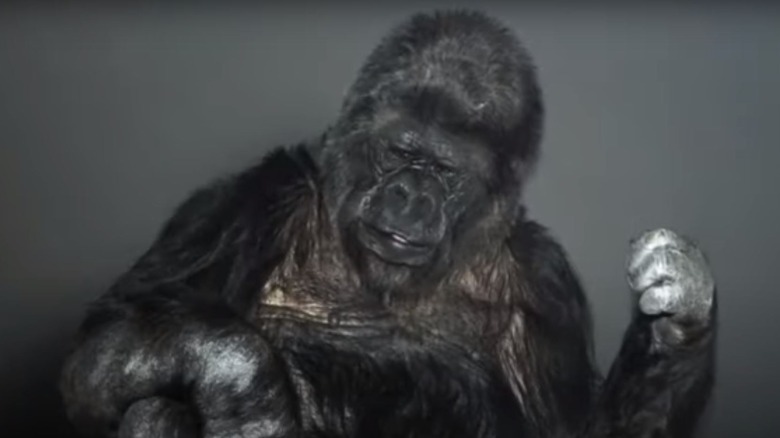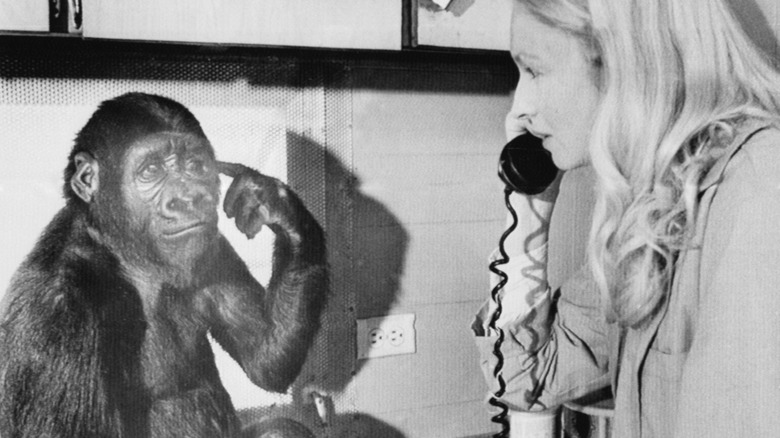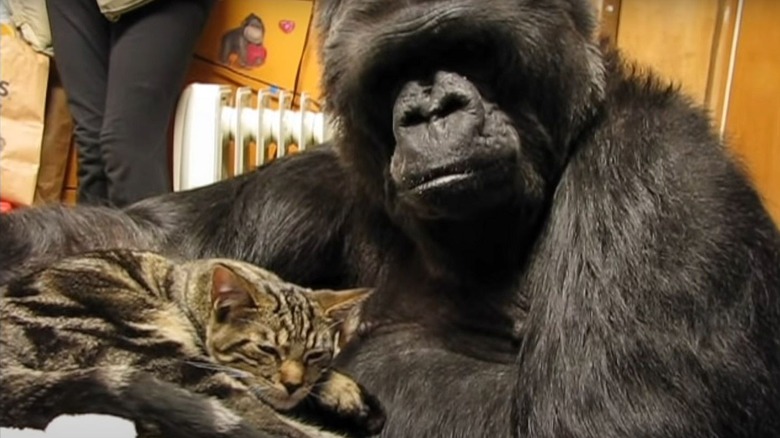What We Know About Koko The Gorilla's Final Words
When Koko the gorilla died in 2018 at the age of 46, the world lost a critical window not only into the minds of our animal siblings but our mutual ties to our planet. Koko, who became a kind of public celebrity and representative of the natural world, learned 1,000 American Sign Language (ASL) words and knew 2,000 spoken English words, as ABC News says. We've got countless videos of her communicating with the person who raised her, Francine Patterson, multiple documentaries about her (notably from 1978 and 2016), videos of her hanging out with Mr. Rogers and Robin Williams, footage of her playing with kittens, blowing out birthday candles, telling humanity it's "stupid" for not taking better care of Earth, and much, much more. She was basically the best kind of person.
We don't have any video footage of Koko's final words — that would be a bit morbid. We do, however, have a statement from Francine Patterson about what Koko said before she died. As ABC News says, Koko signed "patient" and "old" — that's it. Patterson said that Koko looked a bit worried, and took the short message to mean, "Hey, I'm getting on." Koko then died in her sleep. A bit later, AP News reported that the aforementioned "humanity needs to take care of Earth" video got promoted on Instagram as Koko's last message. That message was potent and acted as a good coda to Koko's life, but it wasn't actually the last thing she said.
The voice of her species
For those who aren't familiar with Koko's story, the Gorilla Foundation tells the tale in full. Koko was born in 1971 in the San Francisco Zoo, got rejected by her mother after becoming ill, and took on a human parental figure: Francine "Penny" Patterson. Patterson was doing her graduate dissertation in psychology at Stanford at the time, saw Koko in the zoo, and decided to dedicate "at least a few years" to the baby gorilla as part of her dissertation, but ultimately engaged in a lifelong experiment to see just how deeply she and Koko could communicate. So when Koko — full name Hanabi-ko ("fireworks child" in Japanese) — learned how to sign for food, drink, etc., within the first year of her life, Patterson was well on her way to founding Project Koko. Originally formed as a means to teach Koko American Sign Language (ASL), Project Koko's goals — much like Koko's impact — expanded to encompass an array of conservational, educational, and research-driven ends.
Rather than just grunt and point and hope to communicate with our gorilla cousins, Patterson and her team developed a specific methodology — Interspecies Communication (IC) — for teaching and implementing ASL as the means of speaking with primates like Koko. Koko became a media sensation and the de facto spokesperson for the entire venture, but the Gorilla Foundation interacted with three gorillas total, including Michael and Ndume. All three are western lowland gorillas, a critically endangered species that the Smithsonian National Zoo describes as a "quiet, peaceful, and non-aggressive" herbivore.
Touching the lives of many
Francine Patterson could have never predicted the impact that Koko had on her life and the lives of those around the world. When Koko died in 2018 at the age of 46, Patterson — then 71 — said on ABC News, "I'm totally aware of how blessed and magical my life has been with her ... She was perfect." On Fox KTVU Channel 2 Patterson said, "People ask me if I have any children and I say, 'No, I have three gorillas.'" Gary Stanley, Chief Operating Officer of The Gorilla Foundation, said, "It's hit everyone really hard. We were expecting her [Koko] to live a lot longer." The Smithsonian National Zoo says that western lowland gorillas in the wild live into their 30s, but can survive into their 50s in captivity.
As ABC News says, Koko died of natural causes. She had a condition called cardiomyopathy, which the Mayo Clinic says makes it for the heart to pump blood throughout the body. Koko's friend, the aforementioned Michael, also had cardiomyopathy and died in 2000 at 27. As the Gorilla Foundation's Interspecies Communication page says, researchers believe that the condition has to do with stress, as gorillas are as "emotionally fragile" as they are physically strong.
Media outlets jumped on Koko's death, and disinformation — like taking Koko's environmental message as her final words, per AP News — spread around. But thankfully, she just died peacefully in her sleep.


